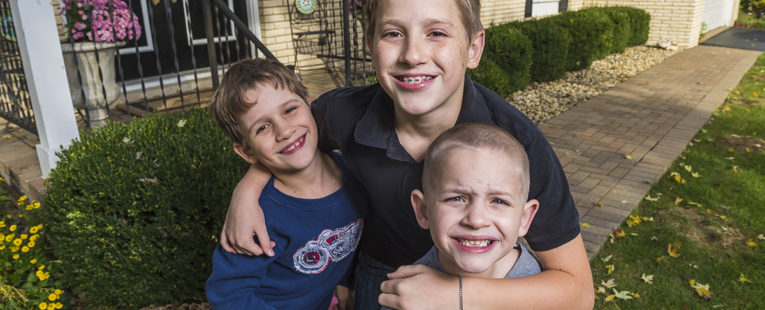Michelle Marcinak of Peoria has spent years learning about and managing eosinophilic esophagitis, a chronic digestive condition that has affected three of her young sons. Pediatric gastroenterologist Sandeep Gupta, MD, of the Pediatric Gastroenterology Clinic at OSF HealthCare Children’s Hospital of Illinois, has spent decades researching and treating this disorder. Both doctor and parent feel fortunate that their paths have come together.
Searching for answers
 Michelle’s crash course in digestive disorders began when her son, 7 years old at the time, began experiencing recurrent nausea and stomachaches. Treatment for possible food allergies and acid reflux didn’t help.
Michelle’s crash course in digestive disorders began when her son, 7 years old at the time, began experiencing recurrent nausea and stomachaches. Treatment for possible food allergies and acid reflux didn’t help.
One day, Michelle happened to pick up a magazine in a doctor’s office with an article on eosinophilic esophagitis, a condition in which certain types of white blood cells—eosinophils—normally produced in response to infections or allergies, appear for unknown reasons in the esophagus. Children with the disease often experience nausea, trouble swallowing, abdominal pain and a susceptibility to allergies.
“As I went down the list of symptoms, I realized that my son had every one,” Michelle said. She brought up the condition to the gastroenterologist her son was seeing at the time, who confirmed the diagnosis with a biopsy of his esophageal tissue.
Michelle decided to seek specialized treatment at Cincinnati Children’s Hospital Medical Center—a five-hour drive away. The doctors at Cincinnati Children’s diagnosed another of Michelle’s sons with eosinophilic esophagitis when he turned seven.
“We were happy with our sons’ treatment at Cincinnati Children’s, but the time and expense of traveling to Cincinnati a few times a year was tough on the whole family,” she said. “Then, one of the gastroenterologists mentioned that a colleague of his, Dr. Gupta, had just moved to Peoria and was practicing at Children’s Hospital.”
She made an appointment, and the family liked him immediately.
Pioneering research and treatment
Dr. Gupta had started investigating eosinophilic esophagitis in 1994. “At the time, doctors thought it was just a type of food allergy,” he said. “The only treatment was avoiding the types of foods thought to trigger the inflammation.” Dr. Gupta published his first paper on the condition in 1995 and was at the forefront of trying new treatments, including different types of steroids.
“Today, it’s estimated that about one in 2,000 people have eosinophilic esophagitis, so it’s quite common,” he said. “We believe that it’s a chronic condition, similar to diabetes or high blood pressure, that requires long-term management.”
Treatment involves swallowing small doses of steroids through an inhaler or as a paste (the same type of inhaler and medication used to treat asthma). Patients need to undergo endoscopies with biopsies to assess disease status, to confirm that the treatment is working and to fine-tune correct medication dosages. They may need to avoid certain trigger foods, as well.
Dr. Gupta moved to Peoria last year after seeing a need for specialized pediatric gastroenterology care in the region. “I found Peoria to be a lovely community, and Children’s Hospital is a great place to work,” he said.
Connecting close to home
“Dr. Gupta is such a wonderful clinician and so personable,” Michelle said. “He takes the time to educate me so I’m making the best choice for each of my children, whose symptoms and treatments are different.”
Michelle’s two sons did well under Dr. Gupta’s care, and when a third son started experiencing symptoms of eosinophilic esophagitis earlier this year, Dr. Gupta diagnosed and began treating him, as well.
Michelle admits that having three children with this condition is challenging, but her sons are thriving.
“They have full, active lives, and much of that is due to Dr. Gupta’s excellent care,” she aid. “He has a big-picture view of this complex disease and is knowledgeable about all the latest research, and he’s also very hands-on in monitoring every aspect of my children’s health.”
Dr. Gupta said that caring for families like Michelle’s is the reason he chose his field.
“Forming relationships with my patients and feeling that I’m making a difference in their lives by educating and empowering them—that’s the highlight of my days,” he said. “And because we work as a team to manage chronic conditions like eosinophilic esophagitis, I’m constantly learning from my patients and their parents, too. Without them, I wouldn’t be where I am today.”
Last Updated: February 9, 2022
